
Background information
Really, Pokémon’s just getting worse? You couldn’t be further from the truth!
by Cassie Mammone
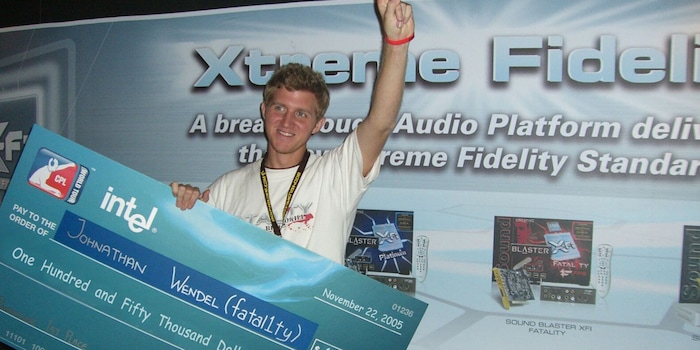
Johnathan Wendel, better known as Ftal1ty, is considered the first pro gamer in history. His career took off with rocket jumps in «Quake III Arena». Today, he mainly plays «Valorant», but secretly hopes arena shooters will make a comeback.
Two players chase each other through a futuristic yet medieval-looking fortress. A huge pentagram adorns the floor in the middle of the level. The movements of the two players are so fast that watching them makes you dizzy. When one hits the other with a futuristic weapon, all that remains is a squishy red pile of polygons. The camera follows the player called Fatal1ty. Although he «only» takes third place in this tournament, it will be the start of his career as a professional gamer. The game is called «Quake III Arena», the tournament is Frag 3 and the year is 1999.
Fast forward more than 20 years, and it’s rare for Fatal1ty to play «Quake III Arena». His gaming tournament days are also a thing of the past – with a few exceptions that is. In an interview via Google Meet, Johnathan Wendel, which is his real name, looks back on his career, talks about how he predicted the Battle Royale genre and explains why he wants arena shooters to return.
How did you become the first pro gamer?
Johnathan Fatal1ty Wendel: «Quake 1» was my first contact with first-person shooters. I started playing tournaments at 11 or 12 years old and won every tournament I entered for about three years. Then I entered the big pro tournament Frag 3 in 1999. It’s hard to tell what was pro back then. But I think everyone agreed that all the best players were there. They were flying in from all around the world. So I consider this the moment I went pro, because I actually won money. Before that it was just small prizes, internet subscriptions and such. In 1999, 25-thousand-dollar prize money was a different deal. At the same time, it was like a massive LAN party. I remember running around in my socks. I was having a great time. Hanging around with my friends, getting to meet everyone for the first time because no one knew what the others looked like. All we knew were our nicknames. So every time we met each other it was like: «Oh you're Fatal1ty. Oh, you're Devour and you're Culprit? Dude, I play with you all the time!» It was so much fun.
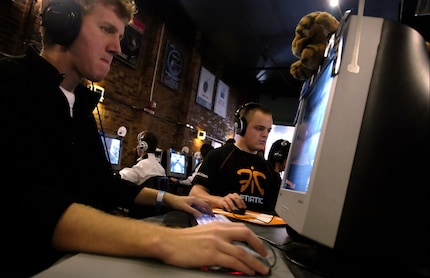
You took third place at Frag 3. What do you remember from your first pro tournament?
We had all seen demos of each other playing. One of my demos got very popular before the tournament. I was the dark horse and everyone knew to watch out for Fatal1ty. I ended up third, though. It really pissed me off. It was a mental mistake. I didn’t play right. I should have waited my spawn out, but I don't think it was in my playbook yet. But I learned from that mistake. After that, I was on a mission and went on to win almost every tournament I entered that year.
«I remember running around in my socks.»
Whenever I lost, I would throw away my shoes, my shirt, my pants. Whatever I was wearing was bad luck. I couldn’t wear that anymore. I’d always try to learn what I did wrong and use it to my advantage so I wouldn’t make that same mistake again.
Did you still go to school while practising and travelling to tournaments?
I’d just graduated from high school and I was going to college part-time. I basically found a way to make money playing video games very quickly. So I ended up leaving school and focusing 100 percent on gaming. I had prize money coming in, all my travel and food expenses were paid for. I think I ended up making over 110,000 dollars my first year as a professional gamer.
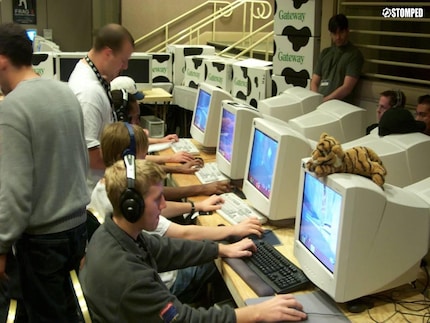
Are there things you think you missed out on?
As an 18-year-old kid I lived a very full life. Playing sports every day, hanging out with my friends and my girlfriend. But a part of me deep down wanted to see if I was talented enough to play with the best players in the world. I felt I never got the chance to dedicate all my energy to one thing. I was always like the renaissance guy. I was good at everything but never the best. So I wanted to put all my effort, energy, training, diet to one goal and be the best gamer in the world. So I went on and executed that.
Sacrifices were my family and friends. But I also made new friends. New friends and people that had the same dream that I had. I wouldn't change it for anything. It was the best time of my life. I was training, travelling the world playing video games, winning on the biggest stages. It launched my career making products for gamers, pushing the esports. It's just been an amazing ride.
What did your family or friends think about you becoming a pro?
I was one of the first guys to really break out in these sports. Before me there was a guy named Dennis Thresh Fong. He won a Ferrari for playing video games. From there on, every gamer knew that you could win really cool shit in gaming. After Thresh, I became the guy who really started pushing the envelope. I created my own hardware and my own products. It took a little while for my parents to understand it, but I was making good money. The thing is, there's no retirement plan for professional gamers. So I had to be smart with my money.
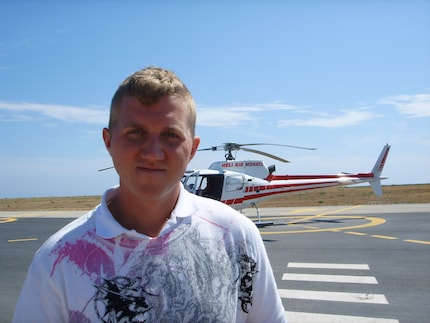
So you started your own product line.
I had to be an entrepreneur. With the first money I made, I instantly started making products for gamers. I thought if I made all this money playing video games, I’m going to lose it all playing video games. That’s why I started investing in myself, making hardware for gamers; like mouse pads and so forth. Eventually, I partnered with major manufacturers to make Fatal1ty products across the globe. I took a big bet on myself. I created a brand for gamers and that turned out to be one of the best decisions of my life.
«The thing is, there's no retirement plan for professional gamers.»
Long before it became mainstream, you created these huge mouse pads. How did you come up with the ideas for your products?
As a kid, I always wanted to make products for gamers. Because I noticed when I played six hours at a time that my wrist got sore. You have different pain points when you spend that much time in front of a computer. So I created the first large gaming mouse pad in the world. There was this company that made these printer pads. I just started using them as a mouse pad. And as I won tournament after tournament, every gamer asked me what kind of mouse pad that was. So I started branding the mouse pad because no one was making it.
And where did you sell your products?
Initially, I sold everything off my own website. But I soon started doing distribution calls to salespeople in Germany, Japan and China. I was making business phone calls like: «Hey you should distribute my Fatal1ty mouse pad.» And they'd be like: «You’re Fatal1ty? And you're selling mouse pads?» It was really funny, and I was only 22 years old.
I still have a Fatal1ty sound card at home.
Those were licensing deals with companies who wanted to sponsor me. I wasn't really available for sponsorships at that time of my career. I was only doing partnerships. Together with Creative Labs, 8-bit or whoever, I was designing Fatal1ty products aimed at gamers.
So it wasn’t just a branding? You were involved in the development?
Yes. But with motherboards, for example, a little bit less because I'm not a motherboard designer. But I could tell them things like: This gives me better input lag. Can I overclock it? Can I get this thing at a higher frequency? And then they started building the specs out on the motherboard to my liking.
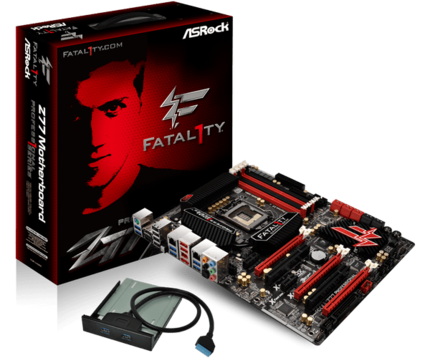
How important do you think the equipment really is? Some people play with 240 Hz while others swear by a CRT.
I think CRTs are amazing. But they don't really exist anymore. And you're only getting about three milliseconds of lower latency on a CRT versus a TN panel. I think I still have my CRT in my back room. I broke it out a couple times to play PUBG on it. But it just wasn't working as you think it would. There's no 4:3 option so it doesn't come across correctly. And there’s just a lot of games that just don’t work.
Going from 60 Hz to 120 Hz, on the other hand, was a massive deal back in the day. If you aren’t playing at 144 hertz, you aren’t playing the game to its full potential. So equipment is definitely important. I feel like you're good with 144 Hz. Going to 240, I don't really notice a massive difference.
My philosophy was I never want the equipment to be the reason I lost. So I always had the best equipment available at the time. The last thing I wanted to worry about was my equipment. Back in the day, we were playing with ball mice. I used to have a screwdriver, rubbing alcohol and Q-tips to clean my mouse. I still have the ball mouse over here. I remember when the Microsoft Intellimouse 2.0 came out. It’s probably still the best optical gaming mouse, period. And it came out almost 20 years ago and it still kills people really good.
Do you play with a cable mouse or wireless?
I’ve actually been playing with the wireless lately to test it out. I'm all about testing things out. There’s a hair of latency. But I'm pretty impressed. Typically, I'm a corded mouse guy. If I was playing a pro tournament, I'd probably stick to the wired mouse. But I recently played a show match and I won with a wireless mouse. It's not like going from 60 hertz to 144. That's a massive upgrade. Because the more frames you see, the more opportunity you have to see what your opponent is doing and are able to react.
What makes a good esports game?
I like 1 vs. 1 deathmatch games. I think there's a lot of skill there. The hand-eye coordination in shooters is so extreme that a player can really outplay someone given the opportunity. I’m not a big fan of having characters with abilities and all that kind of stuff. I think it should be an even playing ground. That was how we played it. You spawn in and everyone's equal. You fight it out. Mano a mano. I like fast games. I like games that don't restrict me. I'm not a big fan of sniper rifles, because it caters to camping and slow play. I like games where you have to press forward to fight. I want to see action. I want to see fireworks. I want to see people fragging it out.
So you must like the Gulag in «Call of Duty war zone».
The Gulag is a cool addition to Battle Royale games. Battle Royale games are a lot of fun. There's a dynamic of camping in that game too, but I still like it. I got number one in North America solos for «PUBG». I wasn’t pressing forward. I was playing the numbers. I was hiding in huts, behind trees or whatever. Trying to get my angle, only coming out when I had to sacrifice myself. You try to narrow it down, so the enemy can only come from one or two angles.
You’ve shown that you can still compete and be the best. Is age no issue for you?
I never really had that problem. I think what gamers go through is that they eventually have responsibilities, or they have distractions that lower their skill level. They can't practise as hard or play as hard. For me, my whole career was always to be able to compete at the very highest level and win. When I stepped away from esports, it was to help esports grow and get more mainstream coverage. I did everything I set out to do in esports. The timing for me to move to my next transition was perfect. But arena shooters kind of fell off when I quit, too. And I was mostly known for being the 1 vs. 1 guy.
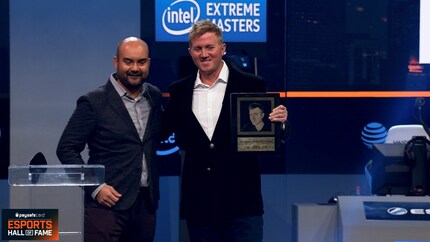
Pros are usually young players around 20. How much does it depend on reflexes and how much is it just the time and dedication you can muster?
If you look at basketball or golf or any other sport, there is always the OG. I'm only 39, but in the gaming world I'm definitely the older guy. Two years ago or so, I was playing «PUBG» and I decided to become number one on the North American leaderboards. It took me a month and a half and I was able to achieve it. I did my old training regiment, practice, practice, practice. And was able to get the number one spot and hold it for like ten days. I was trying to show people that it's not an age thing or a reflex thing. Of course these things naturally deteriorate. But the amount of knowledge and experience I have from playing games over two decades gives me an edge younger kids just don't have.
I don't think there's too much of an age barrier. But young kids don’t have to worry about paying rent. They don’t have to worry about real life stuff. That's kind of how I got into esports. I tried to reduce all of my responsibilities, so I could be the best in the world. My goal was to strip everything.
«I'm only 39, but in the gaming world I'm definitely the older guy.»
What will you do after your esports career ends?
You can always go to YouTube, Twitch or whatever social platform and try to be an entertainer. You’d probably build up some kind of following, so hopefully you can put that into a career. There are plenty of jobs in esports and gaming. Commentator, product marketing, community manager. And if those things don't work out then you just have to go back to school.
You said it yourself, you're one of the oldest players in the game. How has esports changed since you started?
In 2005, I played my last big world championship. It was ten stops across the world. Asia, Europe, America, South America. We were everywhere. That was the beginning of esports going to the next level. We proved the point of live-streaming long before Twitch and all this stuff happened. We did a live stream of my match. We had over 90 countries tuned in. We were definitely ahead of our time.
And where did you stream back in 2005?
MTV overdrive would live-stream the whole production. It was a pretty big deal. There was a million-dollar world tour. The biggest tournament in esports history at that time.
And yet, esports still feel small compared to more mainstream sports.
The fans are there. The problem is getting the mainstream connected to esports and making it easier for people to be reminded when these things are happening. When a Superbowl is about to happen, we are blasted on TV and there's media everywhere to remind people of when that event is. One of my new companies is called «ready up». Our goal is to help people find and follow esports. We want to make it easier for the mainstream to get into esports.
So when do you think esports will become mainstream?
It already passed a lot of traditional sports. It definitely has the numbers to prove it. Esports continue to get bigger every day. I don't see it stopping now.
Still, there is the problem that esports are often difficult to watch and to understand what’s happening.
That’s why I always liked a 1 vs. 1 deathmatch. It's very easy to understand. That guy killed that guy. It’s very linear, like a boxing match. But those types of games have been taken out of the circuit. Game developers have stepped away from making high skill cap games. They're more about teamwork now. When a game requires a lot of skill, like an arena shooter, most people can't hold a candle to it. They hate it.
Another difficulty in esports is that you always have new games.
That's what makes it fresh and exciting too. It's not the same thing over and over and over again. How many times can you watch someone doing an ability that you know the outcome before it happens? When a new game comes out, it's fun because everyone starts over.
What do you think may be the next big thing?
That’s so funny, because I predicted the Battle Royale. One of my friends asked me the same question man years ago. I told him, if I had a hundred people on a server and «Last Man Standing», that would be the coolest thing ever. And, boom, it happened. That was 2014 or 2015 before everything came out. Now we're diving back into «Counter-Strike» with «Valorant». And I’m like: Why is there no arena battle? I just miss the fast-paced shooters. I started playing with «Quake» and «Doom», and I’m always hoping they would do something cool like a Quake Royale or a Doom Royale. I hope that the evolution of shooters is that we'll go back to arena shooters.
As a child, I wasn't allowed to have any consoles. It was only with the arrival of the family's 486 PC that the magical world of gaming opened up to me. Today, I'm overcompensating accordingly. Only a lack of time and money prevents me from trying out every game there is and decorating my shelf with rare retro consoles.
Interesting facts about products, behind-the-scenes looks at manufacturers and deep-dives on interesting people.
Show all
Background information
by Cassie Mammone
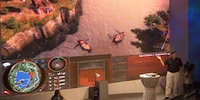
Background information
by Philipp Rüegg

Background information
by Anika Schulz